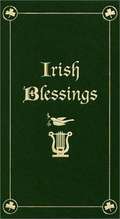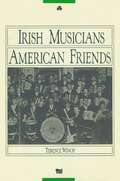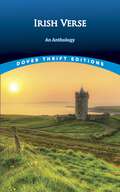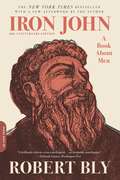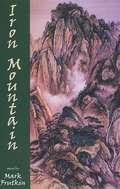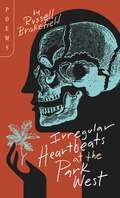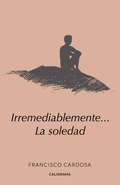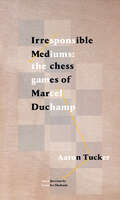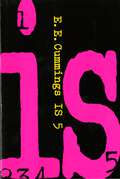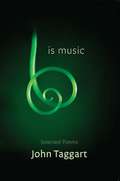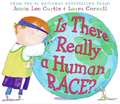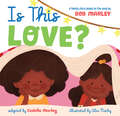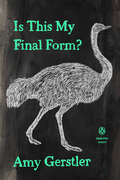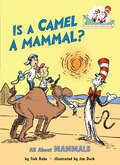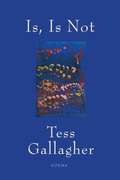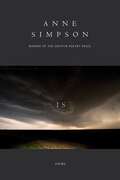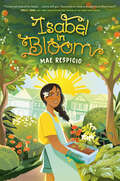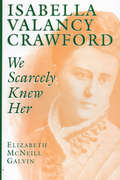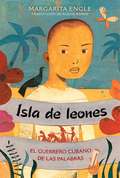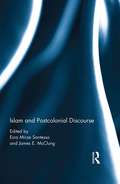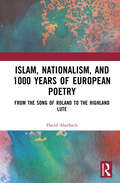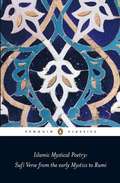- Table View
- List View
Iris of Creation
by Marvin BellEmotional and intellectual rigor are everywhere abundant in the poems of Iris of Creation. Marvin Bell's poems often begin where personal, philosophical, and political experiences intersect, or as Henry Carlile wrote in The Ohio Review, 'One often senses that a Bell poem begins where other poets quit.' Bell's quirky, lively imagination and idiomatic language admit a plethora of influences and experiences, articulating the need for personal transformation from within. This collection displays the poet at the height of his powers.
Irish Blessings: With Legends, Poems & Greetings
by Kitty NashHere is a collection of short Irish blessings, prayers, poems and legends. Collectively they honor the Irish people's love of their country, friendship, humor, friendship, god, history and more. They will touch your day with inspiration, feelings of encouragement, cheer, gratitude and wit. They are also material to be shared to uplift your family and friends. Most of the entries are anonymous but Irelands writers and collector's of traditions are also represented.
Irish Musicians/American Friends
by Terence Winch"The poems completely move me as being Irish, they get the depth, the unspeaking of our very private people. The language is just right each time the way they pretend they are not poems. They rescue the lost emigrant culture, making a real Ireland and real myth out of Irish America. I am convinced it is a pioneer effort." -James Liddy, Back Cover
Irish Poetry under the Union, 1801-1924
by Matthew CampbellThis book retells the story of Irish poetry written in English between the union of Britain and Ireland in 1801 and the early years of the Irish Free State. Through careful poetic and historical analysis, Matthew Campbell offers ways to read that poetry as ruptured, musical, translated and new. The book starts with the Romantic songs and parodies of nationalist and unionist writers - Moore, Mahony, Ferguson and Mangan - in times of defeat, resurgence and famine. It continues through a discussion of English Victorian poets such as Tennyson, Arnold and Hopkins, who wrote Irish poems as the British Empire unraveled. Campbell's treatment ends with Yeats, seeking a new poetry emerging from under union in times of violence and civil war. The book offers both a literary history of nineteenth-century Irish poetry and a way of reading it for scholars of Irish studies as well as Romantic and Victorian literature.
Irish Sayings
by Tony Mills Penny Mills[from the back cover] "'There's no lore until there's a family! 'A Tyrone woman will never buy a rabbit without a head for fear it's a cat! This pot-pourri of proverbs and sayings has insights on such subjects as Friends and Enemies, Food and Drink, and the Irish themselves. The thoughts and observations gathered here often embody truths that are applicable throughout the world, but they are sauced with a blend of wit and perception which makes them typically Irish." Many pictures are described enhancing the Irish atmosphere.
Irish Verse: An Anthology (Dover Thrift Editions)
by Bob BlaisdellCelebrated for their unique poetic sensibility and wondrous way with words, the Irish have produced a rich heritage of great poetry. This volume attests to the Irish love of language, spanning fourteen centuries of literary history and featuring works by more than 60 of the Emerald Isle's most distinguished poets.This comprehensive selection of well-known poems by distinguished writers includes "Verses for Women Who Cry Apples, etc." by Jonathan Swift; J. Sheridan LeFanu's "A Drunkard's Address to a Bottle of Whiskey"; William Allingham's "Four Ducks on a Pond"; "Requiescat" by Oscar Wilde; W. B. Yeats' "The Song of Wandering Aengus" and "Easter 1916"; "Forgiveness" by A. E.; "The Hills of Cualann" by Joseph Campbell; "An Old Woman of the Roads" by Padraic Colum; "In the Poppy Field" by James Stephens; and many others.Also included is a generous sampling of memorable works by lesser known poets: "Lament for Thomas Davis" by Samuel Ferguson; Dion Boucicault's "The Wearing of the Green"; "The Wee Lassie's First Luve" by G. F. Savage-Armstrong; Francis A. Fahy's "Little Mary Cassidy"; Sidney Royse Lysaght's "The Penalty of Love"; and many more, including the anonymous "A Confession of Forgiveness," "Pearl of the White Beast," and "Johnny, I Hardly Knew Ye."Students, teachers, and all poetry lovers will cherish this fine collection and its diverse cross-section of Irish poetry, from the seventh century to modern times.
Iron John: A Book About Men
by Robert BlyIn this timeless and deeply learned classic, poet and translator Robert Bly offers nothing less than a new vision of what it means to be a man. Bly's vision is based on his ongoing work with men, as well as on reflections on his own life. He addresses the devastating effects of remote fathers and mourns the disappearance of male initiation rites in our culture. Finding rich meaning in ancient stories and legends, Bly uses the Grimm fairy tale "Iron John"--in which a mentor or "Wild Man" guides a young man through eight stages of male growth--to remind us of ways of knowing long forgotten, images of deep and vigorous masculinity centered in feeling and protective of the young. At once down-to-earth and elevated, combining the grandeur of myth with the practical and often painful lessons of our own histories, Iron John is an astonishing work that will continue to guide and inspire men--and women--for years to come.
Iron Mountain
by Mark FrutkinOf one of Mark Frutkin’s previous books of verse, Poetry Canada Review said it provided "a supernatural fusion of the earthbound with the heavenly to forge the lightning of poetry." Divided into two sections, one inspired by ancient Chinese art, the other limning the ambiguities and incongruities of the contemporary human condition, Frutkin’s new volume of poetry, Iron Mountain, often presents human beings wandering in the wilderness between two abysses while still appreciating the smell of pines, the softness of the rain, the brilliance of the stars, the hum of the computer, and the jostle of the crowd on the bus. These are poems of translucent delicacy harbouring hard truths where "A Taoist priest gulps the elixir/of immortality and blows away/in the dust,/a young Chinese girl/bumps me in the crowd/prompting a shiver/like a startled phoenix/dressed in my skin." In Frutkin’s vision the entire world is a written landscape that speaks to us of time, of change, of immutability, of radiant emptiness.
Irregular Heartbeats at the Park West (Made in Michigan Writers Series)
by Russell BrakefieldWith musical language and vivid imagery, Irregular Heartbeats at the Park West attunes us to the sheer wonder of being alive. Intimate reflections on family histories, hardship, and everyday life reveal the ways art and nature can lift us from grief and serve as lodestars in an increasingly uncertain world. Russell Brakefield’s poems span American landscapes and personal experience, dropping down in music venues and dark barrooms, back alleys and suburbs, brightly lit galleries and lonely graveyards. How do we manage the weight, one poem asks, of carrying all our histories inside us? The poet hunts for answers everywhere, seeking insights into the particulars of the natural world and the minutiae of everyday life. Inspired by an assemblage of Americana and a litany of literary landmarks—from spiritual epiphanies at the Hemingway house to a reckoning with privilege in Lucille Clifton’s Baltimore—Brakefield explores how poetry can be influenced, propped up, and contorted by the American canon. Drawing on a depth of emotion, wit, and reverence for nature, this striking new collection captures the beautiful and often poignant complexities of the human experience.
Irremediablemente... la soledad
by Francisco CardosaNo busques en mí a un escritor (al uso) solo soy un contador de historias. Este libro que tienes en tus manos no es una novela, no es poesía. Ni siquiera son canciones. Habla de la vida, situaciones cotidianas, miedos, amores y rupturas. Todo ello mezclado con un toque de ironía, frivolidad y por qué no, con un punto de humor.
Irresponsible Mediums: The Chess Games of Marcel Duchamp
by Aaron TuckerWith an Introduction by World Chess Champion Jennifer ShahadeIn 1968, avant-garde artist Marcel Duchamp and composer John Cage exhibited Reunion, a chess performance that took place in Toronto. Whenever Duchamp or Cage moved a piece, it generated a musical note until the game was transformed into a symphony.Inspired by this performance, Irresponsible Mediums—poet and academic Aaron Tucker's second full-length collection of poems—translates Duchamp's chess games into poems using the ChessBard (an app co-created by Tucker and Jody Miller) and in the process, recreates Duchamp's joyous approach to making art, while also generating startling computer-made poems that blend the analog and digital in strange and surprising combinations.
Is 5
by E. E. CummingsFresh and candid, by turns earthy, tender, defiant, and romantic, Cummings's poems celebrate the uniqueness of each individual, the need to protest the dehumanizing force of organizations, and the exuberant power of love.
Is Music
by John Taggart"John Taggart's poetry is not like music, it is music."--George OppenIs Music--a major retrospective of an American original--gathers the best poems from John Taggart's fourteen volumes, ranging from early objectivist experiments and jazz-influenced improvisational pieces to longer breathtaking compositions regarded as underground masterpieces. There is a prayerful quality to Taggart's poetry, rooted in music--from medieval Christian traditions and soul to American punk rock. He is also heavily influenced by the visual arts, most notably in his classic "Slow Song for Mark Rothko," in which he did with words what Rothko did with paint and dye.To breathe and stretch one's arms againto breathe through the mouth to breathe tobreathe through the mouth to utter inthe most quiet way not to whisper not to whisperto breathe through the mouth in the most quiet way tobreathe to sing to breathe to sing to breatheto sing the most quiet way.To sing to light the most quiet light in darknessradiantia radiantiasinging light in darkness.To sing as the host sings in his house. John Taggart is the author of fourteen books of poetry and two books of criticism. He was, for many years, a professor of English and director of the Interdisciplinary Arts Program at Shippensburg University. He lives near Shippensburg, Pennsylvania.
Is There Really a Human Race?
by Jamie Lee CurtisIs there really a human race? Is it going on now all over the place? When did it start? Who said, "Ready, Set, Go"? Did it start on my birthday? I really must know. With all these questions, our hero's imagination is off and running. Is the human race an obstacle course? Is it a spring? Does he get his own lane? Does he get his own coach? Written with Jamie Lee Curtis's humor and heart and illustrated with Laura Cornell's wordly wit, IS THERE REALLY A HUMAN RACE? is all about relishing the journey and making good choices along the way--because how we live and how we love is how we learn to make the world a better place, one small step at a time.
Is This Love (Marley)
by Bob Marley Cedella MarleyRelive the magic of Bob Marley's most beloved songs in this newest picture book adaptation!Is this love?Is this love that I'm feeling?Bob Marley's music has captured the hearts and souls of families around the world. This sweet adaptation of one of his best loved songs is a heartwarming tale of an older child's love for a younger sibling.From the moment she sees her baby sister, big sister knows just what she's going to do: love her and treat her right, every day and every night. Playing together, watching over her, standing by her through thick and thin . . . big sister does it all, because yes, this is love that she's feeling.Adapted by Cedella Marley, Bob Marley's eldest child, and exuberantly illustrated by Alea Marley, Is This Love is a joyful ode to the unshakeable love shared by all those who call one another family.BOB MARLEY FANS: This new addition to the series based on the lyrics of famed reggae musician Bob Marley introduces his music and ideals to the youngest of readers, while inspiring nostalgia in older ones.GREAT READ ALOUD: The musical refrains make for fun and predictable read-alouds at story time and bedtime.SIBLING LOVE: Warm and lyrical, this book is a familiar ode to the unbreakable and enduring bond between sisters, making it a perfect gift to welcome a new family member or celebrate important milestones.SWEET MESSAGE FOR FAMILIES: Imaginative and vibrant, parents and caregivers will appreciate the endearing message of this picture book, recognizing that love comes in all forms and the importance of treasuring special times with family every day.Perfect for: Parents and grandparentsTeachers and librariansFans of Bob MarleyGift-givers looking for sweet picture books
Is This My Final Form? (Penguin Poets)
by Amy GerstlerA poet renowned for her &“wit and complexity&” (Poetry Foundation) explores the endless evolution and malleability of life on earth in her most curious, inventive collection to dateAren&’t we all shape-shifters? Is any animal, vegetable, or mineral—even a commonplace object—what it seems to be at any given moment? Who isn&’t juggling constant transformations, conflicting roles, changing loyalties, loves, perceptions, and selves, all while being pummeled by shifting devotions, emotions, and obsessions? Do even the dead continue to evolve in surprising ways?Reveling in these questions, Gerstler&’s latest protean poetry collection includes loose sonnets, shapely praise of Mae West, the lament of an actor who can&’t shed his costume, dramatic monologues, whiffs of gender slippage, a love lyric to the bride of Frankenstein, and a ten-minute play.
Is a Camel a Mammal? All About Mammals: All About Mammals (The Cat in the Hat's Learning Library)
by Tish RabeLaugh and learn with fun facts about mammals, from the land to the sea, the smallest (pygmy shrew) to the largest (blue whale), and more—all told in Dr. Seuss&’s beloved rhyming style and starring the Cat in the Hat! &“Yes, people are mammals—amazing but true! Oh, and cats in tall hats? Well...yes. We&’re mammals, too!&” The Cat in the Hat&’s Learning Library series combines beloved characters, engaging rhymes, and Seussian illustrations to introduce children to non-fiction topics from the real world! Journey around the world and discover: what makes an animal a mammalwhat the world&’s smallest and largest mammals arehow different mammals take care of their babiesand much more!Perfect for story time and for the youngest readers, Is a Camel a Mammal? All About Mammals also includes an index, glossary, and suggestions for further learning. Look for more books in the Cat in the Hat&’s Learning Library series!High? Low? Where Did It Go? All About Animal CamouflageThe 100 Hats of the Cat in the Hat: A Celebration of the 100th Day of SchoolA Great Day for Pup: All About Wild BabiesWould You Rather Be a Pollywog? All About Pond LifeHappy Pi Day to You! All About Measuring CirclesI Can Name 50 Trees Today! All About TreesFine Feathered Friends: All About BirdsMy, Oh My--A Butterfly! All About ButterfliesOh Say Can You Seed? All About Flowering PlantsInside Your Outside! All About the Human BodyIce is Nice! All About the North and South Poles
Is, Is Not: Poems
by Tess GallagherTess Gallagher’s new poems are suspended between contradiction and beautyIs, Is Not upends our notions of linear time, evokes the spirit and sanctity of place, and hovers daringly at the threshold of what language can nearly deliver while offering alternative corollaries as gifts of its failures. Tess Gallagher’s poems reverberate with the inward clarity of a bell struck on a mountaintop. Guided by humor, grace, and a deep inquiry into the natural world, every poem nudges us toward moments of awe. How else except by delight and velocity would we discover the miracle within the ordinary?Gallagher claims many Wests—the Northwest of America, the Northwest of Ireland, and a West even further to the edge, beyond the physical. These landscapes are charged with invisible energies and inhabited by the people, living and dead, who shape Gallagher’s poems and life. Restorative in every sense, Is, Is Not is the kind of book that takes a lifetime to write—a book of the spirit made manifest by the poet’s unrelenting gaze and her intimate engagement with the mysteries that keep us reaching.
Is: Conversations With My Granddaughter
by Anne SimpsonA stunning new book of poems from the Griffin Poetry Prize-winning author of Loop. A cell is a world within a world within a world. In this remarkable new collection, Anne Simpson finds form and inspiration in the cell – as it divides and multiplies, expanding beyond its borders. As these poems journey from the creation of the world emerging out of chaos to the slow unravelling of a life that is revealed in a poem that twists like a double helix, Simpson illuminates what it means to be alive, here and now. Rich with the muscular craft, vibrant imagery, and exquisite musicality for which her poetry is widely acclaimed, this collection sees Simpson continuing to &“negotiate an ever-changing path between language and structure&” (Vancouver Sun) – with astonishing results. It is a work of great vision from one of our most compelling poetic voices.
Isabel in Bloom
by Mae RespicioA girl discovers a connection between her home in the Philippines and her new home in the U.S. through a special garden in this middle grade novel that celebrates nourishment and growth.Twelve-year-old Isabel is the new kid in her San Francisco middle school. It&’s the first time in many years that she&’ll be living with her mother again. Mama's job in the US allowed Isabel and her grandparents to live more comfortably in the Philippines, but now Isabel doesn't really know her own mother anymore.Making new friends in a new city, a new country, is hard, but joining the gardening and cooking club at school means Isabel will begin to find her way, and maybe she too, will begin to bloom. In this beautifully rendered novel-in-verse, Mae Respicio explores how growth can take many forms, offering both the challenges and joy of new beginnings.
Isabella Valancy Crawford: We Scarcely Knew Her
by Elizabeth Mcneill GalvinConsidered one of the finest of Canada’s early poets, the raw intellect and emotional appeal of Isabella Valancy Crawford’s poetry drew author Elizabeth McNeill Galvin on a personal journey that traced Isabella’s life which began in Dublin, Ireland, and ended in Toronto, Canada.Isabella emigrated to Canada with her family around the year of 1858. After settling first in Paisley, Ontario, the family later lived in Lakefield and Peterborough. As a young woman, Isabella became fascinated by backwoods life and Indian legends. Following her father’s death, she and her mother moved to Toronto where Isabella took on another pioneering role, that of a "modern working woman," by earning meager wages from light verse and "formula fiction" that appeared in Canadian and American newspapers.Not afraid to approach social criticism often deemed the domain of male poets, her poetic sensitivity quivers with imagery and is admired for its evocative portrayal of life in its entirety. Isabella’s work symbolizes the emerging of Canadian maturity as its population was shifting from life in the wilderness, to the creation of urban centres such as Toronto."A good sense of the social background of Crawford’s life."- Gordon Johnston, Master of Otonabee College at Trent University and Professor of Canadian Literature.
Isla de leones (Lion Island): El guerrero cubano de las palabras
by Margarita EngleThe Spanish translation of this &“beautifully written, thought provoking&” (School Library Journal, starred review) novel in verse by Young People&’s Poet Laureate Margarita Engle, which tells the story of Antonio Chuffat, a young man of African, Chinese, and Cuban descent who becomes a champion for civil rights.Asia, Africa, Europe—Antonio Chuffat&’s ancestors clashed and blended on the beautiful island of Cuba. The country is fighting for freedom from Spain. Enslaved Africans and near-enslaved Chinese indentured servants are forced to work long, backbreaking hours in the fields. So Antonio feels lucky to have found a good job as a messenger, where his richly blended cultural background is an asset. Through his work he meets Wing, a young Chinese fruit seller who barely escaped the anti-Asian riots in San Francisco, and his sister Fan, a talented singer. With injustice all around them, the three friends are determined to prove that violence is not the only way to gain liberty. Asia, África, Europa: los ancestros de Antonio chocaron y se mezclaron en la hermosa isla de Cuba. El país lucha por independizarse de España. Los esclavos africanos y los chinos bajo servidumbre por endeudamiento son forzados a trabajar largas horas, rompiéndose el lomo en los campos de cultivo. Por eso Antonio se siente afortunado de haber conseguido trabajo como mensajero, haciendo que su rica mezcla cultural sea una ventaja. A traves de su trabajo conoce a Wing, un joven chino vendedor de frutas que escapó a duras penas de las revueltas contra los asiáticos en California, y su hermana Fan, una talentosa cantante. Con la injusticia rodeándolos por todas partes, los tres amigos han decidido que en estos tiempos de rebelión violenta y esclavitud, las armas no han de ser el único modo de ganar la libertad. Perturbadora, a la vez que hermosa, esta es la historia de un muchacho que se convirtió en campeón de los derechos civiles de quienes no podían hablar por sí mismos.
Islam and Postcolonial Discourse: Purity and Hybridity
by Esra Mirze Santesso James McClungLargely, though not exclusively, as a legacy of the 2001 attack on the World Trade Center, Islamic faith has become synonymous in many corners of the media and academia with violence, which many believe to be its primary mode of expression. The absence of a sophisticated recognition of the wide range of Islamic subjectivities within contemporary culture has created a void in which misinterpretations and hostilities thrive. Responding to the growing importance of religion, specifically Islam, as a cultural signifier in the formation of a postcolonial self, this multidisciplinary collection is organized around contested terms such as secularism, Islamopolitics, female identity, and Islamophobia. The overarching goal of the contributors is to facilitate a deeper understanding of the full range of experiences within Islam as well as the figure of the Muslim, thus enabling a new set of questions about religion’s role in shaping postcolonial identity.
Islam, Nationalism, and 1000 Years of European Poetry: From The Song of Roland to The Highland Lute
by David AberbachIslam, Nationalism, and 1000 Years of European Poetry considers the long history of Islam and European poetry and its central importance in the development of European culture.David Aberbach offers a panoramic history of European poetry as it was affected by the centuries-long conflict between Islam and Christianity, from the early-medieval Old French chanson de geste, The Song of Roland, set against the Muslim invasion of France in the eighth century, to Fishta’s The Highland Lute, the early-twentieth-century Albanian epic of the struggle for independence from Ottoman rule, achieved in 1912. Aberbach surveys some of the outstanding poetry set against Islamic conquests and domination, particularly in Spain and the Balkans. The book includes detailed comparisons between medieval and modern Arabic and Hebrew poetry, closely linked in technique and subject matter, but moving apart after 1789. A result of constant religious warfare in Europe was disillusionment with religion, increasing focus on humanistic concerns, and the evolution of a secular State separate from religion.This captivating history of Islam and European poetry will be of great interest to any scholars of nationalism, Jewish and Islamic Studies, history, comparative literature, and cultural studies.
Islamic Mystical Poetry: Sufi Verse from the Mystics to Rumi
by Mahmood JamalWritten from the ninth to the twentieth century, these poems represent the peak of Islamic Mystical writing, from Rabia Basri to Mian Mohammad Baksh. Reflecting both private devotional love and the attempt to attain union with God and become absorbed into the Divine, many poems in this edition are imbued with the symbols and metaphors that develop many of the central ideas of Sufism: the Lover, the Beloved, the Wine, and the Tavern; while others are more personal and echo the poet’s battle to leave earthly love behind. These translations capture the passion of the original poetry and are accompanied by an introduction on Sufism and the common themes apparent in the works. This edition also includes suggested further reading.

